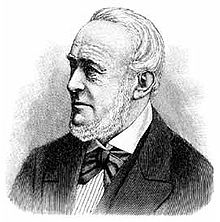Heinrich von Sybel
| Heinrich von Sybel | |
|---|---|
 |
|
| Prussian Landtag | |
|
In office 1862–1864 |
|
|
In office 1874–1880 |
|
| Parliament of the North German Confederation | |
|
In office 1867–1871 |
|
| Personal details | |
| Born |
2 December 1817 Düsseldorf, Kingdom of Prussia |
| Died | 1 August 1895 (aged 77) Marburg, Imperial Germany |
| Occupation | historian |
| Religion | Lutheran |
Heinrich Karl Ludolf von Sybel (2 December 1817 – 1 August 1895), German historian, came from a Protestant family which had long been established at Soest, in Westphalia.
He was born in Düsseldorf, where his father held important posts in the public service under both the French and the Prussians; in 1831 he was raised to the hereditary nobility. His home was one of the centres of the vigorous literary and artistic life for which Düsseldorf was renowned at that time. Sybel was educated at the local Gymnasium, and then at the University of Berlin, where he came under the influences of Friedrich Karl von Savigny and Leopold von Ranke, whose most distinguished pupil he was to become.
After taking his degree, he settled down in 1841 as a Privatdozent in history at the university of Bonn. He had already made himself known by critical studies on the history of the Middle Ages, of which the most important was his Geschichte des ersten Kreuzzuges (History of the First Crusade) (Düsseldorf, 1841; new ed., Leipzig, 1881), a work which, besides its merit as a valuable piece of historical investigation employing the critical methods he had learnt from Ranke, was also of some significance as a protest against the vaguely enthusiastic attitude encouraged by the Romantic school towards the Middle Ages. In 1861 Lady Duff-Gordon published an English translation of a part of this book, to which were added lectures on the crusades delivered in Munich in 1858, under the title History and Literature of the Crusades. This was followed by a study of the growth of German kingship (Die Entstehung des deutschen Königtums, Frankfurt, 1844, and again 1881), after which he was appointed professor.
In the same year (1844) Sybel became prominent as an opponent of the Ultramontane party. The exhibition of the Holy Shroud at Trier had attracted enormous numbers of pilgrims, and so, indignant at what appeared to him a fake, he assisted in publishing an investigation into the authenticity of the celebrated relic. From this time he began to take an active part in contemporary politics and in controversy as a strong but moderate Liberal. In 1846 he was appointed professor at Marburg, and though this small university offered little scope for his activities as a teacher, a seat in the Hessian Landtag gave him his first experience of politics. In 1848 he was present at Frankfurt, but he did not succeed in winning a seat for the National Assembly. His opposition to the extreme democratic and revolutionary party made him unpopular with the mob who broke his windows, and his liberalism made him suspect at court. He sat in the Erfurt parliament of 1850, and was attached to the Gotha party, which hoped for the regeneration of Germany through the leadership of Prussia.
...
Wikipedia
